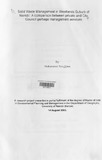| dc.description.abstract | This study focused on Solid Waste Management in the Westlands
suburb of Nairobi and more specifically on the generation of both
commercial and domestic waste in Westlands and the interval of
collection by both private companies and the City Council. The main
objective of this study was to investigate the frequency of collection
and accumulation of solid waste in the Westlands suburb of Nairobi
City in order to assess the environmental impact of solid waste in the
area. The general hypothesis for this study was that solid waste
collection process did not vary between private firms and Nairobi City
Council.
CTo solve the research problem and achieve the objectives of the study,
there was a need to design a suitable investigation method. The research
method had the following components: Data type; Data sources; Data
sampling design; Data collection; Data Analysis In this study, both I
secondary and primary data were used in an attempt to solve the stated
research problem although primary data predominated. The primary data
required for this study were on the following elements relevant to solid
waste management: location of waste bins in the CBD and in four
residential areas; waste generation represented by weight (Kg) from the
units or bins; type of waste per unit or bin; waste management body;
demographic information; spatial information in terms of the City of
Nairobi administrative and road map and; public perception on municipal
solid waste management by survey. The collected data were analyzed
using various analysis techniques or methods. Each variable score was
first tabulated in the field notebooks and the resulting records were then
subjected to the descriptive and spatial analysis methods in order to
provide answers to the research problems and to meet the objectives of
this study.
The results of the data analyses indicated that private companies are
more efficient in waste collection than the City Council in the Westlands.
The residents of Westlands were generally satisfied with the handling of
solid waste in the area by private collection companies but were unhappy
with the performance of the City Council regarding garbage collection and
sanitation. Most of the waste generated in the study area was largely
organic which could easily be composted.
The recommendations of the study are that Dandora dumpsite needs to
be relocated; cleaner production should be encouraged to reduce the
waste at source as a primary option and improvement of recycling and
reusing should be patronized as a secondary option for waste
minimization. Environmental Impact Assessment and ISO 14000 for the
protection of environment should be enforced aggressively. Public
awareness and motivation should be the key for waste reduction and its
effective management. Public awareness about waste minimization must
be propagated in comprehensible language and viable way. Privatization
of municipal solid waste management both wholly or in partnership with
City Council should be encouraged and expedited. The use of traditional
and indigenous material, which is easily biodegradable or durable for use,
should be encouraged. Waste should be managed as a resource. | en |

